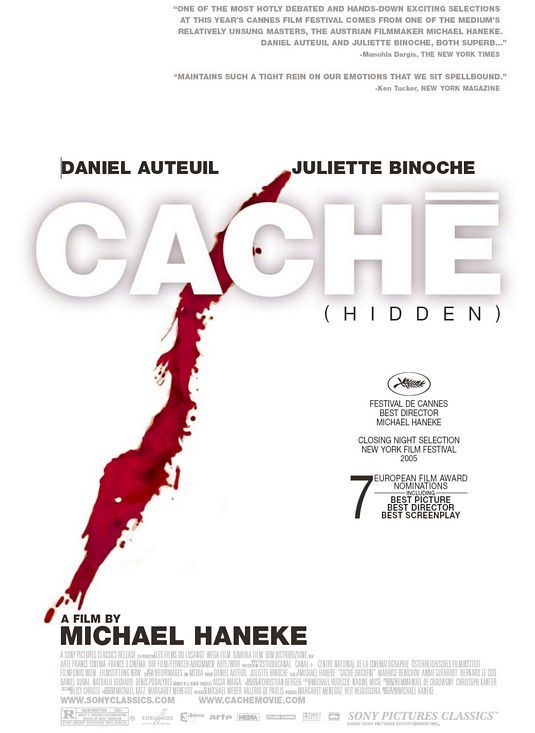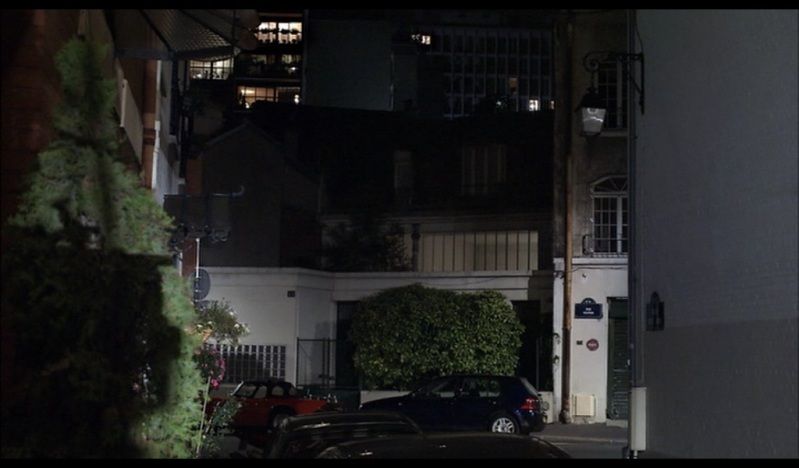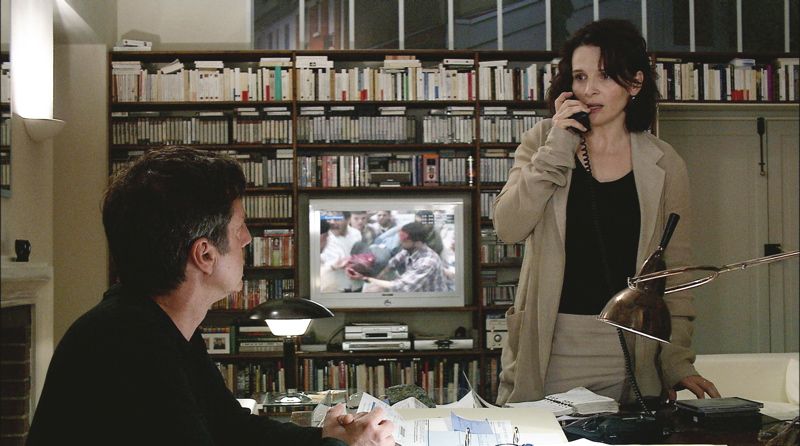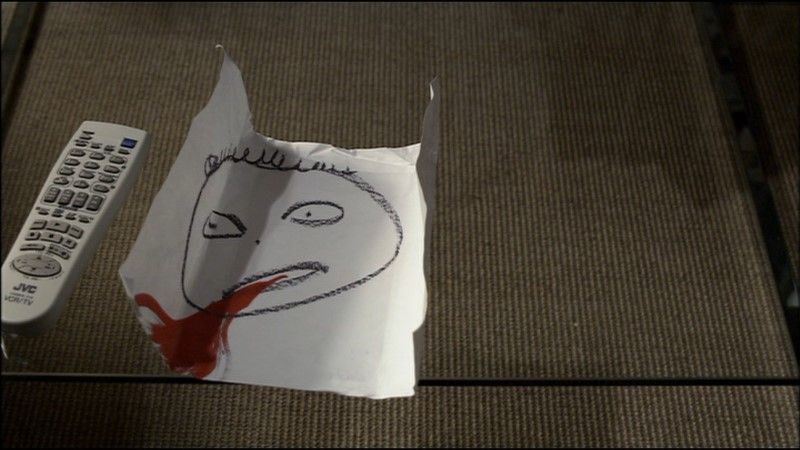Thursday, October 18, 2012
Cache
Caché
2005
Director: Michael Haneke
Starring: Daniel Auteuil, Juliette Binoche, Maurice Bénichou
I don’t like to know everything about a film before I see it, but I like to know the basics: stars, genre, director, at the most a vague outline of the story. All I knew of Caché was that it starred Juliette Binoche (who rocks) and, in the first sentence of the DVD jacket, it was a “psychological thriller.” That was good enough for me, I like psychological thrillers, but that was all I knew.
Then the "directed by Haneke" message hit me, and I realized that, uh, yeah, I really had no idea what I gotten myself into.
Even knowing it was a “psychological thriller,” therefore meant to be, well, thrilling, left me feeling completely blindsided.
This movie freaked me the eff out.
I don’t want to talk too much about the plot (even Roger Ebert, who spoils films fully and freely, managed to write one of his Great Movie essays on this without giving anything of significance away). The main characters are Georges Laurent (Auteuil) and his wife Anne (Binoche). He is the host of a television book discussion program running on public television in Paris, she is a publisher. They have an adolescent son, Pierrot. The film opens with the discovery that someone has been filming them. They know this because videocassettes have been dropped at their front door showing the surveillance of the Laurents. Georges starts to suspect someone he used to know, someone from his past, Majid (Bénichou). The cassettes keep coming, egging Georges and Anne on, keeping them uncomfortably and aggressively aware that they are being watched.
Perhaps to explain why this movie got under my skin as much as it did, I must share a bit of myself first. Every night, as soon as it gets dark outside, I march around the house and draw the shades on all the windows. I cannot tolerate having a window open at night because of a childhood nightmare of seeing a man or creature or something horrible pop up on the other side of the window in the middle of the night. At night, having to walk past a window with an open shade utterly terrifies me; my imagination kicks into very scary gear, imagining all manner of horrors that will suddenly appear on the other side as soon as I pass by.
This is not far off from the idea of being watched, the central threat in Caché. The whole reason that unknown monster suddenly appears on the other side of that window is because it was watching me the whole time. Horror movies that use that as their central conceit are the ones that get under my skin the most. The very idea of being watched is creepy enough to me, but this film takes it so much farther. Hence the whole “Siobhan being really freaked out” thing.
The opening shot of the film is five minutes long. It is of an upper middle class street in Paris. The camera is static. There is no background music, and practically no background noise. Nothing moves in the shot. A bicyclist goes by after a few minutes; this is the first time that something moves, proving that it’s film and not a photo. That’s when it hits you: the title, “Caché,” means “hidden.” We are watching something from a hidden camera; the second shot of the film, where that shot of the street, the Laurents’ home, is revealed to be on the videocassette that they are reviewing. That disconcerting notion, that instead of being shown something by a filmmaker, we have become the watchers from the outside, throws the entire film into disarray. Point of view is incredibly important in this movie. Every time the camera seems to take on a first-person vantage point, I found myself wondering if this was the filmmaker showing me something (as in a “normal” shot), or if it was someone watching someone else. Worse, he takes it to the next level, and our stalkers soon start to film the Laurents not from afar, but from much more intimate settings. Conversations are caught on tape, which means that our trust in knowing whose viewpoint we, as the audience, are seeing, is completely shot. And the really creepy thing is that ultimately, Haneke seems to be saying that I, the viewer, am the one who is tortuously watching the Laurents.
Did I mention this movie creeped me out? Because it really creeped me out.
As the Laurents try to deal with who is watching them and why they are sending them the surveillance footage, we are also treated to the show of people coping with such an invasion of privacy. Hint: they do not deal with it well. Georges and Anne’s marriage seems perfectly fine on the outside, but knowing that someone is watching them wreaks havoc on it. Instead of leaning on each other for support, they quickly turn on one another, becoming frustrated and angry at each other because they do not know who they can be frustrated and angry with on the outside. Their son is in the middle of puberty-riddled angst, which only adds fuel to the fire. As the film progresses, it become very clear that Haneke is not so interested in the reason for the surveillance, or who is doing the watching, but what impact it has on the family in question. We watch (we’re always watching) Georges and Anne deal with the furor of feeling so violated and not knowing how to manage those emotions in a healthy way.
It doesn’t help things that Georges is the main character, the main target of the ever-watching stalker. Instead of giving us a sympathetic hero, Haneke gives us Georges. Very quickly, we learn that Georges has anger management problems. An early encounter with a bicyclist who nearly knocks him down on the street has Georges wildly overreacting, escalating the situation beyond necessity. When Georges starts to suspect Majid, a sad, sympathetic, middle-aged man living on the edge of real poverty, we cannot believe that Georges is so angry at this sad sack of a man whose denials sound completely believable. When Georges doesn’t believe the denials in the least, I sat there wondering how he could be so completely illogical. There’s also a distinct possibility that Georges is racist; the bicyclist from the first encounter is black, and Majid is Algerian. Georges treats Majid’s son with equal hatred, anger, and contempt later in the film. Furthermore, he withholds information that he shouldn’t, thereby giving a second meaning to the word “hidden” of the film title. He and Majid have a past, one that he keeps from his wife, from his ailing mother, and one which slowly unfolds throughout the film. Why he keeps these things from his wife is beyond comprehension, and she is angry about it.
Haneke dresses his sets and actors in blacks, whites, and neutrals, keeping the color palette of the film mostly subdued. When hand drawn illustrations accompanying the cassettes start to have a smear of crimson on them, indicating blood, it provides a stark and disturbing contrast to the muted tones we’ve seen. This contrast and, indeed, surprise, is echoed later when there is real blood, real violence. There is very little violence in this movie, but all of it took me off guard, and all of it was shocking (to the point of me covering my eyes with my hands). The deep, frightening red of the blood was so unnerving against a background of boring taupe.
Did I like Caché? Yes I did, very much, but it completely caught me off guard. I had no idea what I was getting into. I had no idea that the opening shot would make me hold my breath and tense up, that the movie would only ratchet up that feeling as it went along, providing very few moments of catharsis along the way. I also had no idea that Haneke was that clever a director. By playing so much with the idea of the point of view camerawork, he makes you, the viewer, actively involved in the film, constantly questioning what you are seeing and wondering in what context it is being viewed. You must be an active participant in order to unscramble the mystery. He will not force feed it to you.
I really liked Caché, but it would be very difficult for me to watch this one again. It turned me into a blubbering, cowering lump buried into the corner of the sofa. I wish that I was exaggerating; I'm really not. The movie completely and thoroughly unnerved me, giving me nightmares and indelible images that refuse to leave my brain.
I am now going to go around the house and double check that all the drapes are closed. Someone might be watching.
Arbitrary Rating: 9/10. A thinking person’s horror film. Perhaps this is not a traditional horror film, but it is easily the scariest film I have seen in a long time. Furthermore, I honestly cannot remember the last time a film has gotten under my skin the way this film did.
Labels:
1001 movies,
2000s,
2005,
9 out of 10,
cache,
foreign,
french,
haneke
Subscribe to:
Post Comments (Atom)




Wow, you and I had vastly different reactions to this film. First, let me say I understand the fear of what's on the other side of a window at night because I used to be afraid of the same thing when I was little. Nowadays, though, I live in a house surrounded by trees so that I don't even bother closing shades or drapes at night because there's no one around to see in.
ReplyDeleteOf the three Haneke films I've seen (Funny Games, White Ribbon, and this one) this is the one I felt was the least of his works. Rather than being freaked out, I was at first bored, then frustrated.
I agree that the family doesn't handle it well, but that's because they don't handle it at all. "Oh, we got a tape of our house. Oh well. Oh look, we got a second tape. Huh. I wonder what that's about. Oh look, we got a threatening note. Gee I wonder if someone means us harm. Maybe we should tell somebody? Nah." (etc.)
It's the old horror movie trope where the entire movie depends on the main character(s) being as stupid as possible because if they reacted like most normal people the movie would end in 10 minutes. And that's one of the reasons horror movies don't do much for me because I just can't suspend my disbelief for people making such stupid actions.
You mentioned that it didn't make much sense that the husband would not tell the wife. I agree. It's done simply to keep the movie going. If they sat down and talked then the movie would be much shorter.
I completely disagree that the family doesn't handle the problem at all. I just think they handle it incredibly badly. Every member of the family completely internalizes the problem, trying to deal with it in their own, very private way, and that makes everything significantly worse.
DeleteAlso, Haneke, ultimately, cares far less about the problem itself and much more about watching the family unit fall apart. Really, when you get down to it, THAT'S what Cache is all about, how tugging one little string in the Laurent family completely blows them all to smithereens. While that's not exactly horror, I can see how that would be frustrating. You want these people to solve their problems, but they are damaged goods!
"No one around to see me."
Yeah.
No. Not for me. I could be in the most isolated location, and I'd still make sure all the blinds were down, because that's when it's MOST likely the crazy guy will be watching me.
Seriously, I have issues with this concept.
I understand how a concept can just wreak havoc with a person. A personal nightmare for me would be to be trapped somewhere with no one listening to me or believing me when I try to tell them I don't belong there. Because of this One Flew Over the Cuckoo's Nest pushed all my buttons. I can acknowledge that it is a good film, but I will never watch it again.
Delete